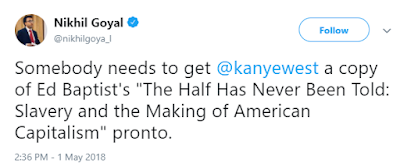At the risk of making this seem like a blog of economic
history obituaries, I think it is necessary to note the passing of Diane
Lindstrom. Here is the
obituary
from the University of Wisconsin.
Along with Robert Gallman, Lawrence Herbst, Paul Uselding
and others Lindstrom challenged the version of American antebellum growth
presented in Doug North’s Economic Growth
of the United States, 1790-1860. In Economic
Growth Doug argued that growth was driven by a combination of cotton exports
and interregional trade, in which Southern specialization in cotton generated
demand for the products of farmers and manufacturers, driving growth in the
rest of the country. Although some new historians of capitalism continue to
cite the theory to demonstrate the central role of slavery in American economic
development, Lindstrom and others had built a strong case against it by the mid-1970s.
She generated evidence to argue that the South was largely
self-sufficient in grain:
Lindstrom, Diane. "Southern Dependence upon
Interregional Grain Supplies: A Review of the Trade Flows,
1840-1860." Agricultural History 44, no. 1 (1970):
101-113.
And she went on to build an alternative explanation of growth
based on the case of Philadelphia. She showed that the development in Philadelphia
was largely driven by the regional market, rather than an inter-regional one:
Lindstrom, Diane L. "Demand, Markets, and Eastern
Economic Development: Philadelphia, 1815-1840." Journal of
Economic History (1975): 271-273; Lindstrom, Diane. Economic
Development in the Philadelphia Region, 1810-1850. Columbia University
Press, 1978; and Lindstrom, Diane. "American economic growth before 1840:
New evidence and new directions." The Journal of Economic History 39,
no. 1 (1979): 289-301.
Subsequent economic historians have expanded on her work. John Majewski, for instance, builds on Lindstrom’s argument
by contrasting the case of Philadelphia with Virginia, showing how slavery led
to conditions that did not promote strong local demand or support long term
growth: A house dividing: Economic development in Pennsylvania and Virginia
before the Civil War. Cambridge University Press, 2000.
I did not know her personally, but anyone interested in understanding American economic development needs to know the argument she developed and the evidence that she collected to support it.
By the way, if anyone is surprised that I, a student of Doug’s,
am posting this you should know that the third edition of North’s Growth and Welfare in the American Past
(coauthored with Terry Anderson and Peter Hill) states that “The spread of the
cotton economy in the South and the development of the cotton export trade are
elements of a well known story. It now appears, however, that economic historians
have overemphasized the pattern of regional interdependence among the South,
the West, and the Northeast (page 72)” and cites Lindstrom in the bibliography
for that chapter. Doug once told me that the only good thing about getting old
was that he knew lots of things that did not work.


